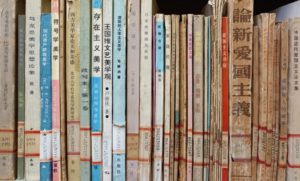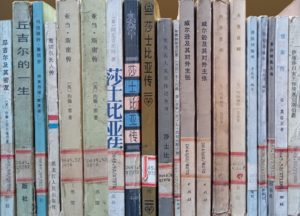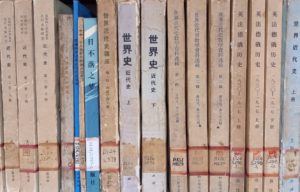SASS Collection at FAU
Introduction to the Collection
The SASS Collection of Intellectual, Social, and Technological History of the People’s Republic of China is a 2006 donation of the Shanghai Academy of Social Sciences (SASS) to the Institute of Sinology at the University Erlangen-Nuremberg (FAU). Due to lack of space, the Academy had to sort out its library duplicates that thanks to a decade-long research cooperation found a new home in Germany (instead of being recycled as waste paper). The collection contains approximately 100,000 monographs as well as a variety of periodicals (approx. 10,000 bounded volumes) published from the late 1940s to the 1980s, offering an extensive overview of knowledge production during the Maoist era that was defined by a primacy of ideology.
It features a wide range of publications, from translated Marxist classics to medical textbooks, from philosophical and literary works to agriculture handbooks and propaganda pamphlets, from popular youth magazines to academic journals. The collection’s major fields are technology and science (19,000 volumes), economics, industry, agriculture, and commerce (15,000 volumes), history and historical science (11,000 volumes) as well as literature and arts (14,000 volumes), dating from the second half of the 1940s to the 1980s. The collection offers a trove of primary materials that help to understand political propaganda, economic development, scientific innovation, and cultural production of the Mao era. Next to official sources it also contains documents “for internal distribution” (neibu faxing 内部发行) that allow insights into how the party-state shaped and controlled information in Chinese society, and how the inner workings of the ideological apparatus functioned.



The collection has many books (monographs and textbooks) on natural sciences, engineering (with blueprints of machines), geology, medicine, astronomy, etc. Researchers of history may trace the anti-Japanese sentiment in current China back to the publications on the “Anti-Japanese War” (1937-45) in the 1950s and the 1960s. They can also feel the political climate of the early PRC by looking at the discourse of liberating Taiwan in the mid-1950s. Books and pamphlets of the Cultural Revolution highlight the use of ideology to persecute the so-called class enemy.
In the field of cultural studies, the collection includes materials on the perennial campaign of “Learning from Lei Feng” display an impressive variety as oral performance (music/lyric, traditional opera scripts, bamboo clapper talk, drama for children), textual narrative (Lei Feng’s diary, poems on Lei Feng, children’s story, movie script) as well as picture albums, which allow the researcher to trace the changing connotations and forms of propaganda in the campaign from 1963 to the mid-1970s. The abundance of scripts of drama and opera in the 1950s and 1960s can be used for investigating the modernizing/propagandizing process of these genres as well as their role in promoting the ideas of patriotism, class struggle, revolutionary spirit, and socialist construction in the first decades of the PRC.
In the field of literature, the collection houses an immense variety of Chinese and foreign (i.e. translated, and not limited to the Soviet Union) literary works, ranging from propaganda literature and publications of populist stories encouraging anti-Western sentiments during the early 1960s to crime stories and science fiction.
For further information about the collection see the bookshelves. For inquiries on how to visit the collection please do not hesitate to contact us.